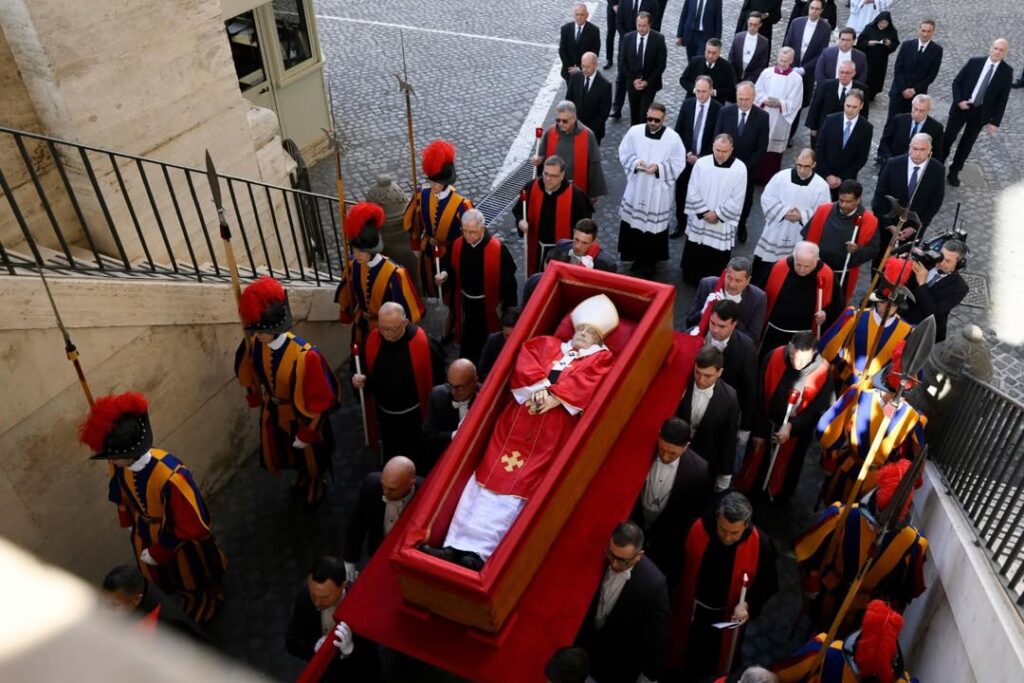“God will “neither slumber nor sleep”, he always watches over us”
The Pope's words at the recitation of the Angelus

At 12 noon today, the Holy Father Francis looked out of the studio window in the Vatican Apostolic Palace to recite the Angelus with the faithful and pilgrims gathered in St. Peter’s Square. These were the Pope’s words in introducing the Marian prayer:
Before the Angelus
Dear brothers and sisters, buongiorno!
The Gospel of today’s Liturgy presents us the three parables of mercy (cf. Lk 15, 4-32); this is what they are called because they show God’s merciful heart. Jesus tells them to respond to the grumblings of the pharisees and the scribes, who say: “This fellow welcomes sinners and eats with them” (v.2). They are scandalized because Jesus was among sinners. If for them this is religiously scandalous, Jesus, by welcoming sinners and eating with them, reveals to us that God is just like that: God excludes no one, he wants everyone at his banquet, because he loves everyone as his children: everyone, no-one excluded, everyone. The three parables, then, summarize the heart of the Gospel: God is the Father and comes in search of us whenever we are lost.
Indeed, the protagonists of the parables, who represent God, are a shepherd who searches for the lost sheep, a woman who finds the lost coin, and the father of the prodigal son. Let us dwell on an aspect that all these three protagonists have in common. All three of them essentially have something in common, which we might define thus: restlessness for something that is missing – whether you are missing a sheep, you are missing a coin, you are missing a son – the unease of missing something, all three protagonists of these parables are uneasy because they are missing something. All three, after all, if they were to calculate, could rest easy: the shepherd is missing a sheep, but he has ninety-nine others – “Let it be lost…”; the woman is missing a coin, but has nine others; and even the father has another son, obedient, to devote himself to – why think about the one who has gone off to live a dissolute life? Nonetheless, there is anxiety in their hearts – of the shepherd, the woman and the father – about what is missing: the sheep, the coin, the son who has gone away. One who loves is concerned about the one who is missing, longs for who is absent, seeks who is lost, await who has gone astray. For he wants no-one to be lost.
Brothers and sisters, God is like this: he does not “rest easy” if we stray from Him, he is grieved, He trembles in his innermost being; and he sets out to look for us, until He takes us back into his arms. The Lord does not calculate losses and risks; he has the heart of a father and a mother, and suffers for the lack of his beloved children. “But why does he suffer if this son is a scoundrel, if he has gone?” He suffers, he suffers. God suffers for our distance and when we go astray, he awaits our return. Remember: God always awaits us with open arms, whatever the situation in life in which we are lost may be. As a Psalm says, He will “neither slumber nor sleep”, he always watches over us (cf. 121, 4-5).
Let us look at ourselves now, and ask ourselves: do we imitate the Lord in this, that is, are we anxious about what is missing? Do we have nostalgia for those who are missing, who have drifted from Christian life? Do we carry this inner restlessness, or are we serene and undisturbed among ourselves? In other words, do we truly miss those who are missing from our communities, or do we pretend and not let it touch our hearts? Do I truly miss those who are missing in my life? Or are we comfortable among ourselves, calm and blissful in our groups – “I attend a very good apostolic group…” – without compassion for those who are far away? It is not a question merely of being “open to others”, it is the Gospel! The shepherd of the parable did not say, “I have another ninety-nine sheep, why should I waste time to go and look for the lost one?” Instead, he went to look. Let us then reflect on our relationships: do I pray for those who do not believe, who have drifted away, who are bitter? Do we attract those who are distant through the style of God, which is closeness, compassion and tenderness? The Father asks us to be attentive to the children he misses the most. Let us think of someone we know, who is close to us and has perhaps never heard anyone say, “You know, you are important to God”. “But I am in an irregular situation, I have done this bad thing, that one…”. “You are important to God”, say to him. “You are not searching for him, but he is searching for you”.
Let us – men and women with restless hearts – be troubled by these questions, and pray to Our Lady, mother who never tires of searching for and taking care of us, her children.
Related

Francis. The Human and Religious Imprint of a Papacy
Isabel Orellana
24 April, 2025
5 min

A Pope’s Last Journey: Francis’ Body Transferred to St. Peter’s
Exaudi Staff
24 April, 2025
3 min

Cardinal Felipe Arizmendi: With the Risen Christ, There Is Hope
Felipe Arizmendi
24 April, 2025
6 min

You Didn’t Give Up
Exaudi Staff
23 April, 2025
2 min
 (EN)
(EN)
 (ES)
(ES)
 (IT)
(IT)

